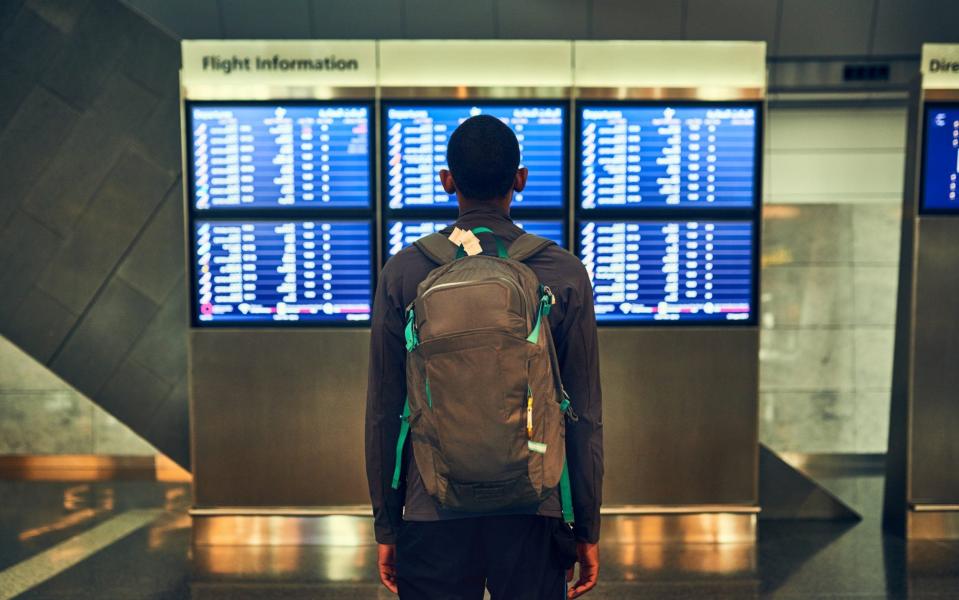Confused about overseas travel? Here are all the rules and advice on amber list holidays

British holidaymakers are able to travel to a select number of amber-listed countries, including Spain, despite Government advice warning otherwise.
Such destinations also include Spanish islands and some Greek islands, to which the Foreign Office does not advise against travel. Passengers arriving in Spain are not required to present evidence of a negative Covid-19 test.
However, the UK Government's advice is "You should not travel to amber list countries or territories". Those who do so will have to self-isolate for up to 10 days on their return home.
Business minister Anne-Marie Trevelyan has said: "The Prime Minister has been clear that, for now, amber means 'please don't go unless there is an urgent family reason and so on' because we are still trying to slowly move through our road map to being able to open up on June 21 and we want to do that in a steady and careful way."
She told Sky News "that means amber countries really aren't safe to go to".
However, since this statement it has been revealed the UK will postponed the June 21 unlocking date by up to four weeks.
The rush to Spain when the country reopened this month to British visitors is perhaps another example of the traffic light system, which was intended to simplify the resumption of overseas travel, only leading to more confusion.
With tour operators running trips to destinations on the amber list, against the advice of the Department for Transport (DfT), but in line with guidance from the Foreign Office (FCDO), choosing where to go on holiday has never been so complicated.
Here, we try to cut through the noise to tell you what exactly you are allowed to do when it comes to a summer break, and what is forbidden by law.
Where am I definitely allowed to go?
The Government’s green list covers the places you are free to travel to for leisure purposes. You will not need to quarantine on return.
The list, announced by the Transport Secretary, Grant Shapps, includes 11 countries and territories, including Australia; New Zealand; Singapore; Brunei: Iceland; Faroe Islands; Gibraltar; Falkland Islands; South Georgia and the South Sandwich Islands; Saint Helena, Ascension & Tristan da Cunha; and Israel.
Are they all letting us in?
No, of the European holiday options (no one is going to South Sandwich for a fly and flop) only Gibraltar and Iceland are allowing Britons to enter for leisure purposes, ie holidays.
Which countries are on the amber list?
The majority of countries have made it onto the amber list, including the likes of Spain, Italy and France. And as of the latest update, Portugal.
What are the amber list rules?
Any travellers arriving in the UK from “amber” countries will be required to self-isolate at home for 10 days (potentially reduced with a paid-for “test to release” on day five). They will also have to take PCR tests on (or before) day two and on day eight of isolation, as well as taking a test before returning to the UK (proof of a negative result can be a printed document or an email or text shown on your phone) and completing a Passenger Locator Form.
The Government currently requires each of these tests to be a PCR test, which can be costly. Prices are slowly being reduced, with one Government-approved provider now charging £45 and Tui offering test packages for "green" destinations from £20.
Am I allowed to go on holiday to an amber list country?
By law, yes. If the country is accepting entry for leisure purposes, there is no legal barrier to stop you from going on holiday to an amber list country, provided you are happy to quarantine on return.
But Grant Shapps said I shouldn’t go on holiday to an amber list country?
That’s right, he did. And the Department for Transport says "you should not travel" to these countries. However, you can. It is guidance and not law.
Does the Foreign Office say I can go?
Well, that depends on where. The FCDO runs its own guidance separate from the DfT which long predates the introduction of the traffic light system. It, for example, does not advise against travel to Spain’s Canary Islands (Lanzarote et al), even though it is on the DfT’s amber list.
What is the difference between FCDO and DfT advice?
The DfT advice is new and in response to the pandemic, whereas the FCDO has long issued guidance on travel. The FCDO advice is not set in law either (you could, for example, always travel to war-torn countries, such as Iraq, if you so pleased even though the Foreign Office would have advised against it).
It is, however, the FCDO advice that typically governs the stance of insurers, and consequently tour operators. Travelling against FCDO advice invalidates the majority of insurance policies, and tour operators (not airlines) will cancel trips to destinations to which the FCDO advises against travel.
Take as an example the coastal destination of Tunisia. After the Sousse attacks in 2015, the FCDO advised against travel to the country, leading tour operators to cancel their trips. When the FCDO lifted the “ban” on travel (that is, changing its advice), tour operators began trips again.
So what are tour operators doing now?
Broadly speaking, they are ignoring the guidance of the DfT and following the advice of the FCDO. They are running trips to amber list destinations, so long as the FCDO does not advise against travel there.
Tui, Europe’s largest tour operator, which is offering trips to some amber destinations, has the following policy.
“If a destination is on the red list meaning you'll need to quarantine in a hotel on your return, we simply won’t go there,” the operator says.
“If – before you depart – we know you’ll have to quarantine at home on your return home, you’ll have the option to change your holiday, as we don’t expect you to do this, but your booking won’t be cancelled.”
On the Beach, too, anticipates trips to amber list countries that do not go against FCDO advice will still run.
EasyJet Holidays says: “Holidays to ‘amber’ destinations can go ahead if you’re happy to travel and follow the re-entry steps set out by the government.”
Why does this matter?
It matters because although tour operators have introduced much greater flexibility in their bookings since the pandemic began, if they do not cancel holidays you will not be legally entitled to a refund. So if you do not want to go to an amber list country, or are unable to because of the quarantine requirements, it’s tough luck.

Can I get insurance for amber list countries?
You can, but there might be fewer providers offering such cover, such as BattleFace. Again, in years gone by, you would have been able to find insurers that would cover you to go to countries to which the Foreign Office advises against travel. Always check the terms and conditions of your policy.
How come airlines are still flying to amber list countries?
Airlines fly wherever there is demand. Airlines are still flying to red list countries, and destinations shut to Britons for leisure purposes, because there are enough people flying for essential reasons.
Is a holiday essential?
Not according to the Government. However, this is not now written into law. Last month, Welsh Secretary Simon Hart recognised that the essential nature of holidays was subjective. He told Times Radio the public should ask themselves whether a trip to a country on the amber list was "essential" before conceding that "some people might think a holiday is essential".

